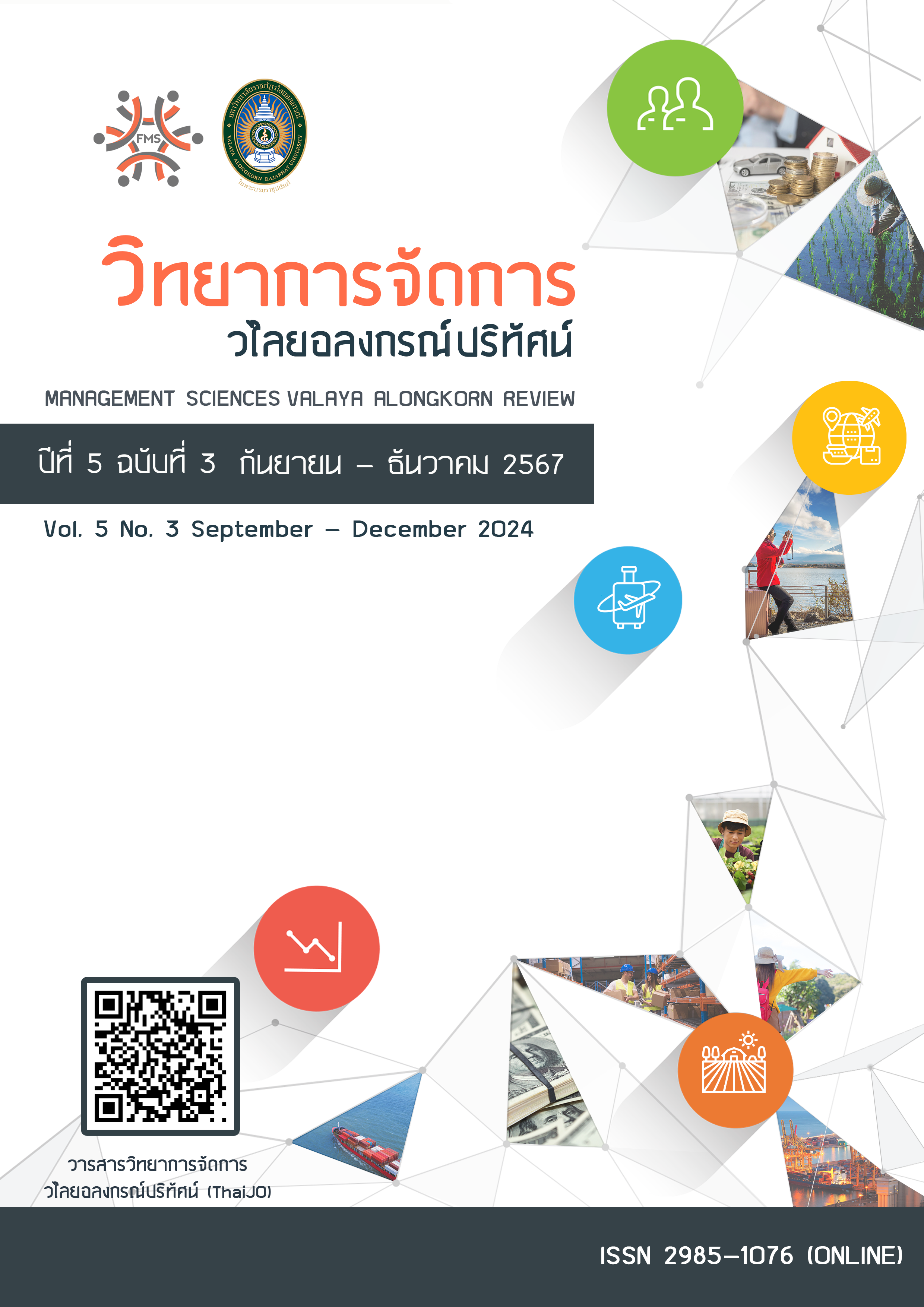แรงจูงใจและวัฒนธรรมองค์กรที่ส่งผลต่อประสิทธิภาพการทำงานของพนักงานร้านสะดวกซื้อในจังหวัดนครพนม
Main Article Content
บทคัดย่อ
การศึกษานี้มีวัตถุประสงค์เพื่อศึกษาระดับประสิทธิภาพการทำงาน เพื่อเปรียบเทียบประสิทธิภาพการทำงานของพนักงานร้านสะดวกซื้อในจังหวัดนครพนมตามปัจจัยส่วนบุคคล และศึกษาความสัมพันธ์ระหว่างแรงจูงใจและวัฒนธรรมองค์กรที่ส่งผลต่อประสิทธิภาพการทำงานของพนักงานร้านสะดวกซื้อในจังหวัดนครพนม กลุ่มตัวอย่างเป็นพนักงาน จำนวน 278 คน โดยใช้วิธีการสุ่มอย่างง่าย เครื่องมือที่ใช้ในการวิจัยเป็นแบบสอบถาม สถิติที่ใช้ในการวิจัยได้แก่ ค่าเฉลี่ย ส่วนเบี่ยงเบนมาตรฐาน ทดสอบค่าที การวิเคราะห์ความแปรปรวนทางเดียวและการวิเคราะห์ความถดถอยเชิงเส้นแบบพหุคูณ พบว่า พนักงานร้านสะดวกซื้อมีประสิทธิภาพการทำงานอยู่ในระดับสูง ปัจจัยส่วนบุคคลด้านระดับการศึกษาต่างกันมีผลต่อประสิทธิภาพการทำงานของพนักงานร้านสะดวกซื้อในนครพนมแตกต่างกันอย่างมีนัยสำคัญทางสถิติที่ระดับ 0.05 ส่วนด้านเพศและอายุงานไม่แตกต่างกัน แรงจูงใจด้านแรงจูงใจภายนอกและด้านเป้าหมายและความต้องการส่งผลต่อประสิทธิภาพการทำงานของพนักงานร้านสะดวกซื้อในนครพนมอย่างมีนัยสำคัญทางสถิติที่ระดับ 0.05 โดยสามารถพยากรณ์ประสิทธิภาพการทำงานได้ร้อยละ 4.2 และวัฒนธรรมองค์กรด้านความห่างเหินทางอำนาจ ด้านความเป็นชายหรือหญิงและด้านการหลีกเลี่ยงความไม่แน่นอนส่งผลต่อประสิทธิภาพการทำงานของพนักงานร้านสะดวกซื้อในนครพนม อย่างมีนัยสำคัญทางสถิติที่ระดับ 0.01 โดยสามารถพยากรณ์ประสิทธิภาพการทำงานได้ร้อยละ 20.4
Article Details

อนุญาตภายใต้เงื่อนไข Creative Commons Attribution-NonCommercial-NoDerivatives 4.0 International License.
บทความ ข้อความ ภาพประกอบ และตารางประกอบที่ลงพิมพ์ในวารสารเป็นความคิดเห็นส่วนตัวของผู้นิพนธ์ ถือเป็นความรับผิดชอบของผู้นิพนธ์แต่เพียงผู้เดียว กองบรรณาธิการไม่จำเป็นต้องเห็นตามและไม่มีส่วนรับผิดชอบใด ๆ
เอกสารอ้างอิง
Ariely, D., & Wertenbroch, K. (2020). Self-control in the marketplace: The role of motivation in consumer behavior. Journal of Consumer Research, 47(4), 494-511.
Bryman, A. (1996). Quantitative data analysis with SPSS for Windows: A guide for social scientists. Routledge.
Chai, C., & Choi, S. (2021). Intrinsic and extrinsic motivation as predictors of employee commitment in service industries. Journal of Service Research, 24(1), 99-112.
Chen, Y., Zhao, L., & Wu, M. (2023). The impact of gender and tenure on employee performance in retail businesses. International Journal of Retail and Distribution Management, 51(4), 512-528.
Chou, C., & Huang, Y. (2021). Sustainable business development and employee performance: The role of motivation. Business Strategy and the Environment, 30(5), 312-327.
Chung, Y., & Zhang, Q. (2022). Uncertainty avoidance and its impact on organizational performance: The role of clear procedures in enhancing work efficiency. Journal of Organizational Behavior, 43(7), 1223-1238. https://doi.org/10.1002/job.2596.
Deci, E. L., & Ryan, R. M. (2020). The significance of intrinsic motivation in human behavior. In M. P. Zanna (Ed.), Advances in experimental social psychology, 27, 1-60. Academic Press.
Deci, E. L., & Ryan, R. M. (2021). The psychology of motivation in the workplace: A critical review. Psychological Bulletin, 147(3), 249-271.
Dörnyei, Z., Csizér, K., & Magid, M. (2020). The role of external motivation in enhancing workplace performance: Rewards and recognition in focus. Journal of Applied Psychology, 105(4), 365-380. https://doi.org/10.1037/apl0000456.
Fernandez, S., & Moldogaziev, T. (2019). The role of organizational culture in employee performance: A comparative study of public and private organizations. Public Administration Review, 79(6), 827-840.
Gupta, N., Kumar, M., & Singh, R. (2021). Gender roles and performance: The role of organizational culture in shaping employee behavior. Journal of Management Development, 40(6), 45-59.
Herzberg, F. (1959). The Motivation to Work. John Wiley & Sons.
Hofstede, G., & Minkov, M. (2020). Cultural dimensions and their influence on organizational performance. Journal of Cross-Cultural Psychology, 51(1), 123-139.
Hofstede, G., Hofstede, G. J., & Minkov, M. (2022). Cultures and organizations: Software of the mind (3rd ed.). McGraw-Hill.
Hsu, C., & Hsieh, S. (2021). External motivation and employee performance: The role of rewards and recognition. International Journal of Human Resource Management, 32(5), 880-900.
Jain, P., & Singh, R. (2023). Exploring sub-factors of organizational culture: A study on employee motivation and performance. International Journal of Management Reviews, 24(3), 209-224.
Kim, H., & Park, S. (2019). The effects of job fatigue on employee performance in the retail sector. Journal of Retail Management, 34(2), 45-60.
Kim, S., & Lee, J. (2021). Workplace performance and its impact on organizational goals: A multidimensional approach. Journal of Business Research, 78, 245-255.
Kim, Y., & Park, H. (2023). Impact of motivation on employee performance: The role of work engagement and job satisfaction. Journal of Organizational Behavior, 44(2), 123-136.
Krejcie, R. V., & Morgan, D. W. (1970). Determining sample size for research activities. Educational and Psychological Measurement, 30(3), 607–610. https://doi.org/10.1177/001316447003000308.
Lee, S., & Patel, A. (2020). Gender, tenure, and work performance in the retail sector: A comparative analysis. Journal of Retailing, 59(2), 243-255.
Lee, S., Chang, H., & Wong, K. (2021). Employee training and its impact on productivity in convenience stores. Asia-Pacific Journal of Business Research, 42(1), 89-103.
Liu, W., Zhang, X., & Wang, H. (2022). The role of organizational culture in enhancing employee satisfaction and performance in service industries. Journal of Service Management, 33(1), 98-112.
Locke, E. A., & Latham, G. P. (2019). Goal setting theory: A motivational framework for organizational behavior. Research in Organizational Behavior, 39, 47-68.
O'Reilly, C. A., & Chatman, J. A. (2020). Organizational culture and employee motivation: Bridging the gap in a changing economy. Academy of Management Perspectives, 34(2), 101-115.
Ryan, R. M., & Deci, E. L. (2020). Self-determination theory and the facilitation of intrinsic motivation, social development, and well-being. American Psychologist, 55(1), 68-78.
Schneider, B., Ehrhart, M. G., & Macey, W. H. (2023). The role of organizational culture in achieving sustainable business success: Insights and future directions. Journal of Applied Psychology, 108(4), 545-558.
Smith, J., Brown, L., & Miller, P. (2023). The role of employee participation and organizational culture in enhancing job performance. Journal of Organizational Behavior, 44(1), 63-75.
Tavitiyaman, P., & Zhang, J. J. (2020). The impact of organizational culture on employee performance: Evidence from the retail industry. International Journal of Retail & Distribution Management, 48(3).
The American Customer Satisfaction Index. (2024). Convenience stores study: Final
report. Retrieved from https://theacsi.org/wp-content/uploads/2024/09/24oct_convenience-stores-STUDY_FINAL-REVISED-2.pdf.
Van den Broeck, A., Vansteenkiste, M., & De Witte, H. (2022). The impact of intrinsic motivation on work performance: A meta-analysis. Journal of Vocational Behavior, 127, 103-115.
Wang, Y., & Liu, F. (2021). The relationship between motivation and employee performance: A systematic review. International Journal of Human Resource Management, 32(1), 45-67.
Wang, Y., & Zhang, L. (2021). Educational attainment and employee performance: The role of enthusiasm and adaptability in the service industry. Service Industries Journal, 41(5), 399-417. https://doi.org/10.1080/02642069.2021.1881234.
Zhang, Z., & Li, J. (2024). Predicting employee performance based on Hofstede's cultural dimensions: Evidence from growing businesses. Journal of Business Research, 156.
motivation on work performance: A meta-analysis. Journal of Vocational Behavior, 127, 103-115.
Wang, Y., & Liu, F. (2021). The relationship between motivation and employee performance: A systematic review. International Journal of Human Resource Management, 32(1), 45-67.
Wang, Y., & Zhang, L. (2021). Educational attainment and employee performance: The role of enthusiasm and adaptability in the service industry. Service Industries Journal, 41(5), 399-417. https://doi.org/10.1080/02642069.2021.1881234.
Zhang, Z., & Li, J. (2024). Predicting employee performance based on Hofstede's cultural dimensions: Evidence from growing businesses. Journal of Business Research, 156.


